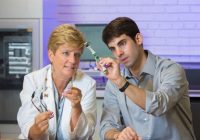Physician-rating websites
Consumers increasingly turn to commercial physician-rating websites, similar to those for restaurants and hotels, when searching for a new doctor, but the sites rarely have information that actually helps patients. “Consumers should still be careful about what they view on these sites,” says David Hanauer, an associate professor at the Medical School and the School of Information. A new study finds that most doctors… Read More »





